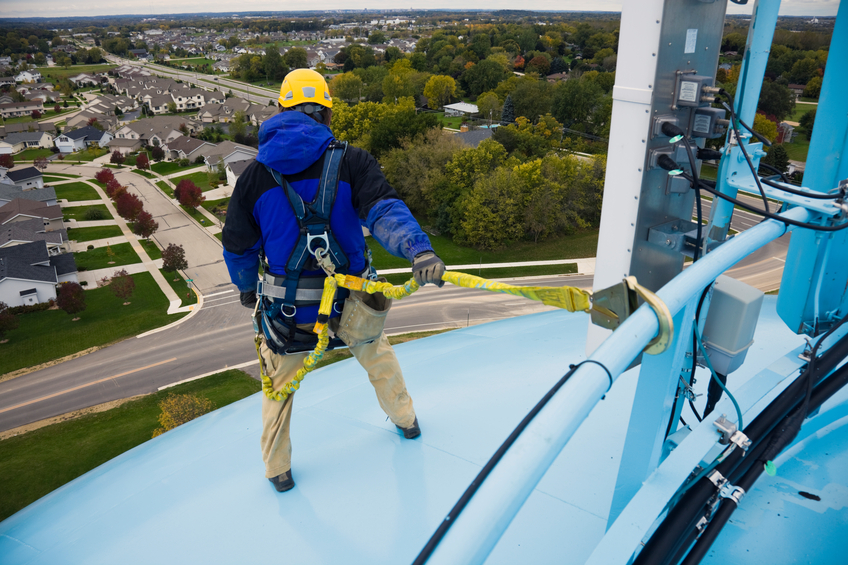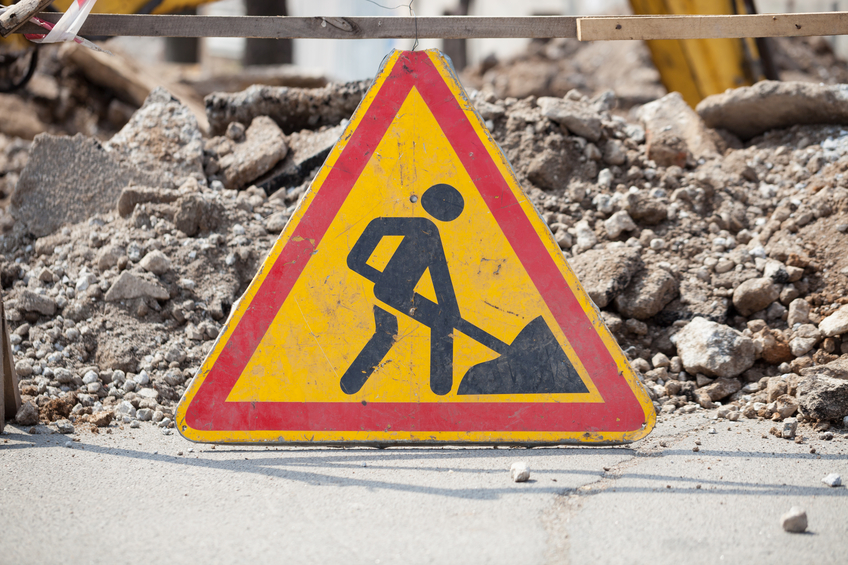Vermont Construction Safety 30 PDH Discount Package 2
Courses in this Package
Fall Protection in Construction (C03-057)
Scaffold Use in the Construction Industry (S06-001)
Trenching and Excavation Safety (C02-072)
Ground-Fault Protection on Construction Sites (E01-001)
Electrical Safety (E06-005)
Safety Concerns in Coating and Painting Operations (C01-011)
Safety Evaluation of Centerline and Shoulder Rumble Strips (C04-048)
Operational Safety on Airports During Construction (C07-016)

This online engineering PDH course presents the OSHA guidelines for fall protection for protecting workers against potential fall hazards.
Historically, falls are the leading cause of fatalities in construction, accounting for about one-third of all fatalities in the industry. Workers involved in working at heights are exposed to potential fall hazards. Accidents involving falls are generally complex events frequently involving a variety of factors
OSHA recognizes that working at heights presents serious hazards to all workers involved. Consequently, the standard for fall protection deals with both the human and equipment-related issues in protecting workers from fall hazards.
This 3 PDH online course is intended for employers/business owners, engineers, managers and construction workers interested in better understanding the Fall Protection in Construction requirements and the reasons behind them.
This PE continuing education course is intended to provide you with the following specific knowledge and skills:
- Identifying potential fall hazards
- Selecting fall protection systems appropriate for existing conditions
- Implementing proper construction and installation of safety systems
- Training and supervising employees in the proper selection, use and maintenance of fall protection systems
In this professional engineering CEU course, you need to review the OSHA Standard, "Fall Protection in Construction", (OSHA 3146), published in 2015.
Once you complete your course review, you need to take a multiple-choice quiz consisting of twenty (20) questions to earn 3 PDH credits. The quiz will be based on this OSHA publication.
Upon successful completion of the quiz, print your Certificate of Completion instantly. (Note: if you are paying by check or money order, you will be able to print it after we receive your payment.) For your convenience, we will also email it to you. Please note that you can log in to your account at any time to access and print your Certificate of Completion.

This online engineering PDH course provides OSHA guidance on scaffolds for protecting workers using scaffolding systems on construction sites.
Scaffolding hazards continue to rank high on the list of most frequently cited standards in the construction industry. Workers involved in working on scaffolding systems are exposed to potential fall hazards. Scaffold-related accidents account for a significant number of fatalities in the construction workplace.
OSHA recognizes that working on scaffolding systems present serious hazards to all workers involved. Therefore, OSHA developed the Scaffold Standard to protect workers using scaffolding systems on construction sites.
This 6 PDH online course is applicable to employers/business owners, engineers, managers, construction contractors/workers and any other personnel working on construction projects that require scaffolding.
This PE continuing education course is intended to provide you with the following specific knowledge and skills:
- Scaffold capacity requirements
- Scaffold platform requirements
- Criteria for supported scaffolds versus suspended scaffolds
- Access and use requirements
- Fall and falling object requirements
- Specific scaffold and aerial lift requirements
- Training requirements
- Construction focused inspection guidelines
In this professional engineering CEU course, you need to review OSHA 3150, "A Guide to Scaffold Use in the Construction Industry".
Upon successful completion of the quiz, print your Certificate of Completion instantly. (Note: if you are paying by check or money order, you will be able to print it after we receive your payment.) For your convenience, we will also email it to you. Please note that you can log in to your account at any time to access and print your Certificate of Completion.

This online engineering PDH course provides guidance on the requirements for excavation and trenching operations. This course describes safe work practices that can protect workers from cave-ins and other hazards.
Trenching and excavation work presents serious hazards to all workers involved. Cave-ins pose the greatest risk and are more likely than some other excavation-related incidents to result in worker fatalities. One cubic yard of soil can weigh as much as a car. An unprotected trench can be an early grave. Employers must ensure that workers enter trenches only after adequate protections are in place to address cave-in hazards. Other potential hazards associated with trenching work include falling loads, hazardous atmospheres and hazards from mobile equipment. Following the requirements of OSHA Excavation standards will prevent or greatly reduce the risk of cave-ins and other excavation-related incidents.
This 2 PDH online course is intended for employers/business owners, engineers, managers, construction workers and any other personnel working on construction projects involving trenching and excavation safety.
This PE continuing education course is intended to provide you with the following specific knowledge and skills:
- Understanding the different risks and dangers of trenching and excavation operations
- Understanding the OSHA Excavation standards and how they protect workers
- Pre-planning excavation work
- Learning the basics of protective systems
Upon successful completion of the quiz, print your Certificate of Completion instantly. (Note: if you are paying by check or money order, you will be able to print it after we receive your payment.) For your convenience, we will also email it to you. Please note that you can log in to your account at any time to access and print your Certificate of Completion.

This online engineering PDH course provides OSHA's electrical requirements for ground fault circuit interrupters to protect workers against electrical hazards.
With the wide use of portable tools on construction sites, the use of flexible cords often becomes necessary. Hazards are created when cords, cord connectors, receptacles, and cord- and plug-connected equipment are improperly used and maintained. Shocks, burns or fire-related fatalities resulting from humans exposed to non-grounded equipment significantly contribute to the overall number of fatalities in the construction workplace.
OSHA recognizes that non-grounded equipment present serious hazards to all workers involved. Therefore, OSHA developed the Electrical Standard that contains the requirements for ground fault circuit interrupters (GFCIs) to protect workers against 120-volt electrical hazards on the construction site.
This 1 PDH online course is applicable to employers/business owners, engineers, managers, electricians, construction workers and any other personnel working with or around energized equipment that require grounding.
This PE continuing education course is intended to provide you with the following specific knowledge and skills:
- What is a GFCI
- What are some other ways to prevent electrical injury
- How can employers protect their workers
- What is the assured equipment grounding conductor program
In this professional engineering CEU course, you need to review OSHA 3007, "Ground-Fault Protection on Construction Sites".
Upon successful completion of the quiz, print your Certificate of Completion instantly. (Note: if you are paying by check or money order, you will be able to print it after we receive your payment.) For your convenience, we will also email it to you. Please note that you can log in to your account at any time to access and print your Certificate of Completion.

This online engineering PDH course describes the hazards of electrical work and basic approaches to working safely.
Whenever working with power tools or on electrical circuits, there is a risk of electrical hazards, especially electrical shock. Anyone can be exposed to these hazards at home or at work. Workers are exposed to more hazards because job sites can be cluttered with tools and materials, fast-paced, and open to the weather. Risk is also higher at work because many jobs involve electric power tools.
Electrical trades workers must pay special attention to electrical hazards because they work on electrical circuits. Coming in contact with an electrical voltage can cause current to flow through the body, resulting in electrical shock and burns. Serious injury or even death may occur. As a source of energy, electricity is used without much thought about the hazards it can cause. Because electricity is a familiar part of our lives, it often is not treated with enough caution. As a result, an average of one worker is electrocuted on the job every day of every year!
This 6 PDH online course is applicable to electrical and mechanical engineers, electricians, plant operators, construction personnel and others seeking an understanding of the basics of electrical system safety.
This PE continuing education course is intended to provide you with the following specific knowledge and skills:
- Understanding the dangers of electricity
- Understanding the dangers of electric shocks
- Familiarizing with the burns caused by electricity
- Learning how to recognize, evaluate, and control hazards
- Knowing how to work safely
Once you complete your course review, you need to take a multiple-choice quiz consisting of thirty (30) questions to earn 6 PDH credits. The quiz will be based on the entire document.
Upon successful completion of the quiz, print your Certificate of Completion instantly. (Note: if you are paying by check or money order, you will be able to print it after we receive your payment.) For your convenience, we will also email it to you. Please note that you can log in to your account at any time to access and print your Certificate of Completion.

This online engineering PDH course describes safety and health issues arising when workers are engaged in coating, painting, and surface preparation operations. The knowledge contained in this course is essential to anyone responsible for worker safety during renovation and maintenance projects involving coating and painting operations.
The 1 PDH online course is intended for civil, environmental, chemical and structural engineers, as well as design professionals and construction personnel interested managing or involved in coating and painting operations.
This PE continuing education course is intended to provide you with the following specific knowledge and skills:
- Learning about hazardous materials handling
- Learning about abrasive blast-cleaning equipment
- Learning about spray equipment
- Learning about welding and cutting of coated steel
- Understanding respiratory protection for toxic chemical control
- Learning about confined space entry
- Learning about storage of flammable liquids, work in confined spaces
- Understanding the toxic effects from exposure to chemicals in coating materials
- Learning about ignition sources such as welding
- Learning about production of toxic airborne contaminants through cutting operations
In this professional engineering CEU course, you need to review Chapter 10 of the "Panting: New Construction and Maintenance" engineering manual, published by the United States Army of Corps of Engineers (USACE), Publication Number EM 1110-2-3400.
Upon successful completion of the quiz, print your Certificate of Completion instantly. (Note: if you are paying by check or money order, you will be able to print it after we receive your payment.) For your convenience, we will also email it to you. Please note that you can log in to your account at any time to access and print your Certificate of Completion.

This online engineering PDH course describes the strategy involving the application of shoulder rumble strips (SRS) and centerline rumble strips (CLRS) in combination. This strategy is intended to reduce the frequency of crashes by alerting drivers that they are about to leave the travelled lane. While research has been published on the safety effectiveness of SRS or CLRS used in isolation, the effectiveness of the combined treatment has not been shown.
Geometric, traffic, and crash data were obtained at treated two-lane rural road locations in Kentucky, Missouri and Pennsylvania. To account for potential selection bias and regression-to-the-mean, an Empirical Bayes (EB) before-after analysis was conducted using reference groups of untreated two-lane rural roads with similar characteristics to the treated sites. A slightly different approach was required for the analysis of the treatment sites in Missouri, which is installing rumble strips on two-lane rural roads whenever a resurfacing project is undertaken. As a result, a suitable reference group with no rumble strips for this road type presently or in the near future did not exist. The analysis also controls for changes in traffic volumes over time and time trends in crash counts unrelated to the treatment.
This 4 PDH online course is intended for traffic engineers, design professionals and construction personnel who are involved in the design and application of centerline and shoulder rumble strips.
This PE continuing education course is intended to provide you with the following specific knowledge and skills:
- Understanding the background information about the strategy and the study
- Familiarizing with previous research of SRS and CLRS
- Learning about the Empirical Bayes (EB) methodology used for the evaluation
- Understanding the data collection of the three States in study
- Familiarizing with the SPFs developed for each State
- Familiarizing with the before-after evaluation results of crashes
Upon successful completion of the quiz, print your Certificate of Completion instantly. (Note: if you are paying by check or money order, you will be able to print it after we receive your payment.) For your convenience, we will also email it to you. Please note that you can log in to your account at any time to access and print your Certificate of Completion.

This online engineering PDH course discusses the key areas for maintaining safety during construction at an airport. It presents details on how to maintain a functioning airport during construction, how to keep construction zones safe, and when to have specific zones open or close during construction.
Safety at construction zones is paramount, and this is even more so at airports where multiple stakeholders are involved in the construction process, including but not limited to the FAA, airport operators, contractors, airport users, and military personnel (at military airports).
This 7 PDH online course is applicable to architects, construction managers, safety, civil, electrical, mechanical, and industrial engineers as well as others interested in learning more about how construction at an airport can be performed safely.
This PE continuing education course is intended to provide you with the following specific knowledge and skills:
- Understanding why maintaining safety at an airport during construction is important
- Learning how to best keep all involved parties and stakeholders safe
- Understanding what is involved in creating a construction safety and phasing plan (CSPP)
- Familiarizing with the guidelines on how to create a construction safety and phasing plan (CSPP)
Upon successful completion of the quiz, print your Certificate of Completion instantly. (Note: if you are paying by check or money order, you will be able to print it after we receive your payment.) For your convenience, we will also email it to you. Please note that you can log in to your account at any time to access and print your Certificate of Completion.